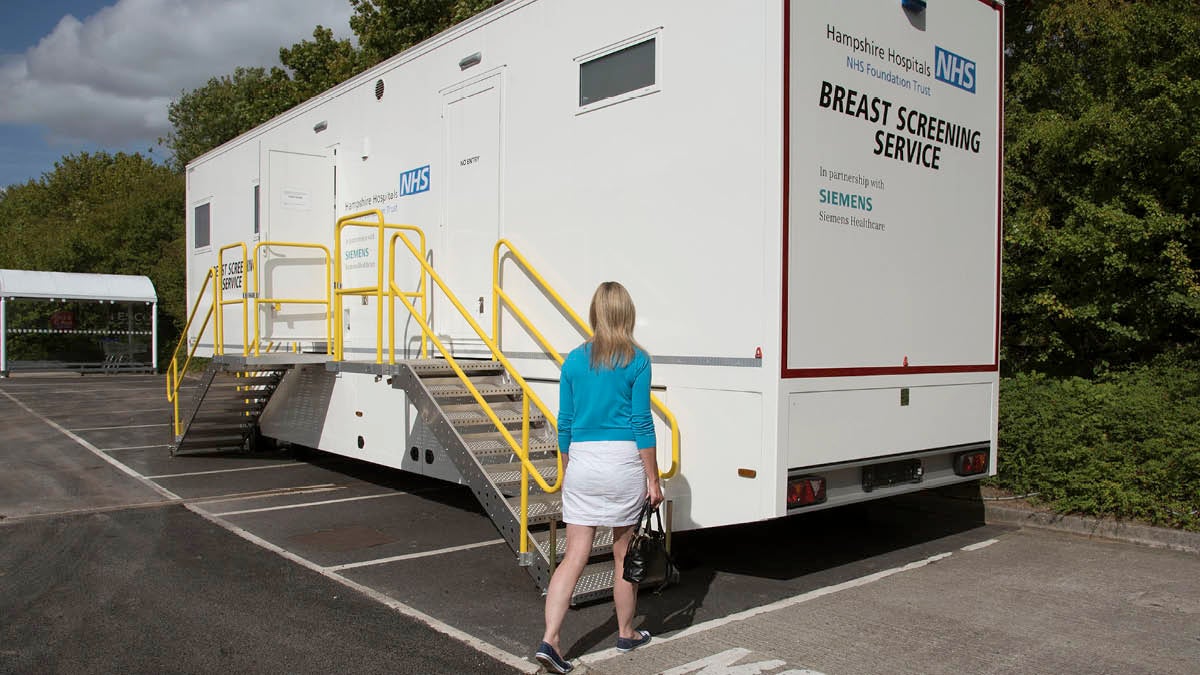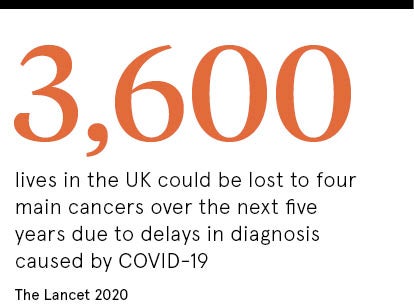
If you take notice of the news headlines, you would think coronavirus is the only major threat to mortality and morbidity. Yet postponing the early screening of cancer also kills. Up to 3,600 lives in the UK could be lost to four main cancers over the next five years due to delays in diagnosis caused by the pandemic, according to research published in The Lancet Oncology, while almost one million women have missed vital breast screening.
Since the start of the pandemic, a perfect storm has occurred for cancer diagnosis in the UK. People have been frightened to attend early scans. There’s also been interruptions in cancer screening services for breast, bowel and cervical cancer, as well as reduced capacity at doctor’s surgeries and a shift in healthcare resources to deal with COVID-19.
“The messaging to the public has been beyond extreme and stopped people presenting themselves. Yet a few weeks’ delay has a huge impact on patient outcomes. We’ve seen significant stage shifts across all types of cancers. People who had symptoms in February are only now going for tests. Our data from The Lancet Oncology paper is now likely to be an underestimate,” says Professor Richard Sullivan from the Institute of Cancer Policy at King’s College London.
Missed diagnostic opportunities have dire consequences
“The impact on screening, especially colorectal, has been highly significant. As friction rises in the pathways to early diagnosis, more people are missed. None of this is rocket science and the UK government and SAGE, the Scientific Advisory Group for Emergencies, have either wilfully ignored this or, unbelievably, not taken this into consideration.”
There are now calls for renewed public health campaigns to encourage more suspected cancer patients to come forward for screening, with a focus on presenting the NHS as a safe environment for testing, since delays in cancer surgery can make cases non-operable.
“If we don’t resolve this we’ll see more patients diagnosed with advanced disease and fewer diagnosed with early stages of cancer. This will impact survival rates. There will be real consequences for some patients in terms of their chances of surviving cancer,” warns Dr Jodie Moffat, head of early diagnosis, Cancer Research UK.
Rapid Diagnostic Centres to the rescue?
Investment in rapid diagnostic centres could help with the backlog. They were designed by the NHS to speed up cancer diagnoses. Pre-pandemic, NHS England committed to rolling out these centres, with the aim of covering the country’s entire population, but this is not expected for several years.
“It is not yet clear what impact COVID-19 will have on this rollout. During the peak of the pandemic, some RDCs remained operational, but others paused, when staff moved to other areas. Concerns remain that progress and expansion of centres will be limited due to the availability of workers,” says Moffat.

The NHS sees rapid diagnostic centres as pivotal to restoring cancer screening services, but some are sceptical of their potential. “These centres are a red herring. The implicit assumption is that these would improve early diagnosis and shift staging. Yet the vast majority of diagnoses are made through standard routes from primary care to local hospital networks,” says Sullivan.
What the near future holds for cancer diagnosis
Despite the gloom during the pandemic, there have been some unforeseen bright spots aside from highlighting the need to push for more screening. “Interestingly, with the increased number of hospitalised patients because of COVID-19, the number of chest CT or computed tomography scans has been growing and, with this rise, the number of incidental cancer diagnoses is also on the up,” says Ade Adeyemi, who heads the global health fellowship at thinktank Chatham House.
Costs have been overlooked in the COVID-cancer paradigm. The fact is cancers in the latter stages of development are much more costly to treat. “The earlier a cancer is diagnosed, the more treatment options are available including less invasive interventions, which are less expensive to the NHS. Later diagnoses also trigger longer periods of hospitalisation affecting the allocation of in-patient resources,” says Dr Sabrina Germain, senior lecturer in medical law at City, University of London.
The plummet in funding for medical charities also impacts early diagnosis. There’s been a shortfall of up to £167 million in cancer research spending from this sector. “Charitable funders support the majority of non-commercial early-detection research in the UK and there’s a danger that it could be even more greatly affected,” says Dr Ian Lewis, head of strategy at the National Cancer Research Institute.
Sara Bainbridge, head of policy at Macmillan Cancer Support, sums it all up: “Cancer must not become the ‘forgotten C’ during this pandemic.”

If you take notice of the news headlines, you would think coronavirus is the only major threat to mortality and morbidity. Yet postponing the early screening of cancer also kills. Up to 3,600 lives in the UK could be lost to four main cancers over the next five years due to delays in diagnosis caused by the pandemic, according to research published in The Lancet Oncology, while almost one million women have missed vital breast screening.
Since the start of the pandemic, a perfect storm has occurred for cancer diagnosis in the UK. People have been frightened to attend early scans. There’s also been interruptions in cancer screening services for breast, bowel and cervical cancer, as well as reduced capacity at doctor’s surgeries and a shift in healthcare resources to deal with COVID-19.
